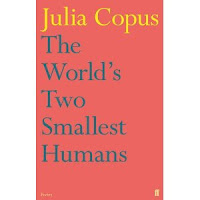Tuesday Poem: Julia Copus - The World's Two Smallest Humans
Inkling
Last night I sensed a taking root
under the bonecage of my heart,
a stirring, shifting; something not
quite of a breath or heartbeat's weight.
It was the inkling of a soul.
Now I shall have no peace at all
till he's caught and fastened, nested in
the cradle of my pelvic bone.
Then, in the coracle of my womb,
I'll carry him gently, every inch home
though the hour is late
in the lengthening light
to the crook of my arm, the bay's curved shore,
water-lapped, twi-lit, secure.
This collection begins with a quote from Hilary Mantel: 'What is to be done with the lost .... but write them into being.' All writing is, as Margaret Atwood observed, 'negotiating with the dead' - descending into Hades like Orpheus and bringing back the lost. Many of these poems deal with loss and longing - the man who stands in the garden, 'earth-bound, heart-sore, his boots in the /frost-stiffened grass, travelling eastwards, against a background of stars'; Heloise and Abelard, Dido (Julia Copus is a classicist). One of my favourites from the collection is a poem called 'This is the poem in which I have not left you', which rewinds time to the moment when, lying in bed, she hears the bird in the garden calling 'do it, do it'.
But I bought the collection for a sequence of poems called 'Ghost' , about the experience of IVF treatment, which I first heard on BBC radio - a programme that was short-listed for the Ted Hughes award for new work in poetry. 'Inkling' is one of the poems in that sequence - they are lyrical poems that go to the bone.
Highly recommended. You may be able to listen to it as a podcast, or on i-player, on this BBC link.
For more Tuesday Poems from round the world, please go to the Tuesday Poem website and check out the side-bar for more contributions.
Last night I sensed a taking root
under the bonecage of my heart,
a stirring, shifting; something not
quite of a breath or heartbeat's weight.
It was the inkling of a soul.
Now I shall have no peace at all
till he's caught and fastened, nested in
the cradle of my pelvic bone.
Then, in the coracle of my womb,
I'll carry him gently, every inch home
though the hour is late
in the lengthening light
to the crook of my arm, the bay's curved shore,
water-lapped, twi-lit, secure.
This collection begins with a quote from Hilary Mantel: 'What is to be done with the lost .... but write them into being.' All writing is, as Margaret Atwood observed, 'negotiating with the dead' - descending into Hades like Orpheus and bringing back the lost. Many of these poems deal with loss and longing - the man who stands in the garden, 'earth-bound, heart-sore, his boots in the /frost-stiffened grass, travelling eastwards, against a background of stars'; Heloise and Abelard, Dido (Julia Copus is a classicist). One of my favourites from the collection is a poem called 'This is the poem in which I have not left you', which rewinds time to the moment when, lying in bed, she hears the bird in the garden calling 'do it, do it'.
But I bought the collection for a sequence of poems called 'Ghost' , about the experience of IVF treatment, which I first heard on BBC radio - a programme that was short-listed for the Ted Hughes award for new work in poetry. 'Inkling' is one of the poems in that sequence - they are lyrical poems that go to the bone.
Highly recommended. You may be able to listen to it as a podcast, or on i-player, on this BBC link.
For more Tuesday Poems from round the world, please go to the Tuesday Poem website and check out the side-bar for more contributions.



What a magical poem!
ReplyDeleteQuite hard words,yet they are so beautifully brought together
Thanks for this Kathleen and Julia. It speaks to life's beginnings so tenderly but with such strength of purpose. I look forward to sourcing 'Ghost'.
ReplyDelete